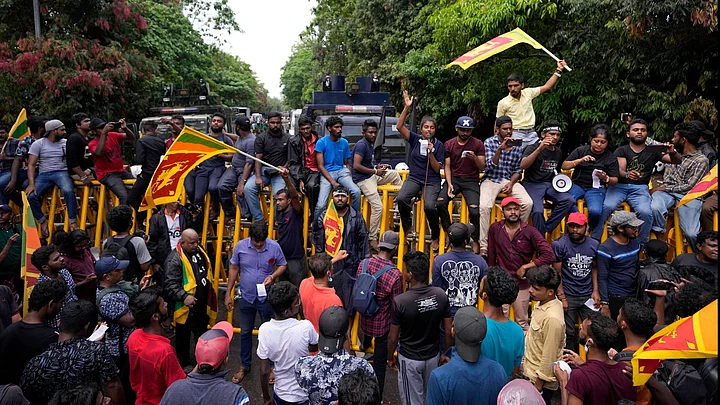Shots were fired in the air from inside the Sri Lankan Prime Minister’s office on Monday, 9 May, to prevent agitated protesters from breaching the inner security ring of the residence where outgoing premier Mahinda Rajapaksa was holed up, police sources told AFP.
Police also fired tear gas to push back protesters who were retaliating against an attack on them earlier on Monday by those loyal to the Rajapaksas.
Several witnesses said that tear gas cannisters hit the United States (US) embassy compound located across from the PM’s residence.
Hundreds of military troops were deployed at the PM’s residence, also called Temple Trees, to guard Mahinda Rajapaksa and his aides after an angry mob pulled down a rear gate.
Protesters Demand President Gotabaya's Resignation
Thousands of protesters had defied an indefinite curfew declared on Monday to maintain their siege on the PM’s residence and demanded the resignation of President Gotabaya Rajapaksa, the outgoing PM’s younger brother, over the country's worst economic crisis since independence in 1948.
Gotabaya had declared a state of emergency in the country from 7 May onwards, giving security forces sweeping powers amid anti-government protests.
This marked the second time in five weeks that an emergency was declared in the country.
PM Mahinda Rajapaksa Resigns
Meanwhile, Mahinda Rajapaksa resigned from the post of Sri Lanka's Prime Minister on Monday, taking to Twitter to announce his decision.
"Effective immediately I have tendered my resignation as Prime Minister to the President," the erstwhile PM wrote.
His resignation came after supporters of Rajapaksa's government, armed with sticks, clashed with protesters outside his residence, severely injuring at least 23 people.
As per AFP, at least a dozen were hospitalised.
The police fired tear gas and used water cannons at the pro-government groups, who crossed police lines and destroyed tents of anti-government protesters, and a nationwide curfew was declared by Sri Lankan authorities in light of the violence.
The island nation has been going through an economic meltdown of a scale unseen since the country's financial crisis of 1948.
Prices of essential commodities like rice, milk, and oil have skyrocketed, resulting in massive nationwide protests and political instability.
(With inputs from AFP.)
(At The Quint, we question everything. Play an active role in shaping our journalism by becoming a member today.)
